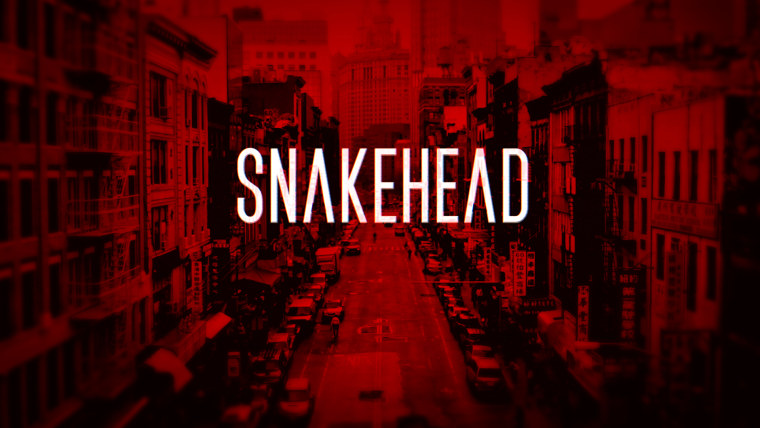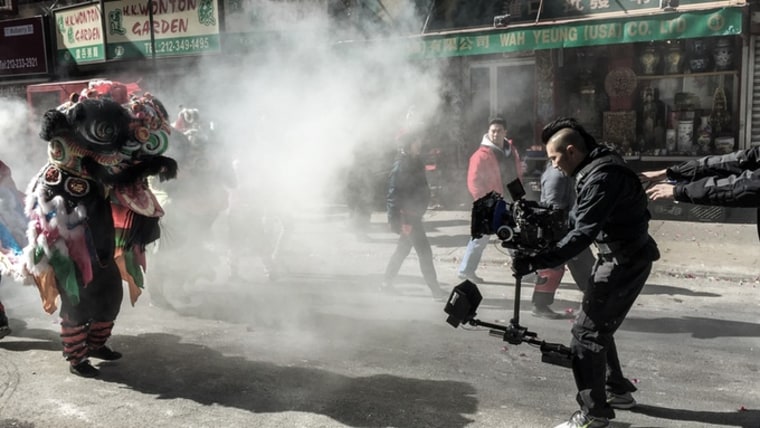In 2007, Evan Jackson Leong wrote a script set in New York's Chinatown inspired by Sister Ping, a human smuggler who brought thousands of Chinese immigrants into the United States, he said. Nine years later, he finally feels ready to make the film.
Leong may best be known for his documentary film "Linsanity," which chronicled the rise of NBA player Jeremy Lin and premiered at the Sundance Film Festival in 2013, and got his start on the set of director Justin Lin's "Better Luck Tomorrow." Leong told NBC News that he decided to make the entire process of producing "Snakehead" a community experience, from the financing — the film is already fully funded on Kickstarter — to shooting and editing, which he will use social media to keep followers consistently informed.
What is your diagnosis of the current state of entertainment ?
The thing about entertainment media is that it’s fairly new. It’s only been around for the last seventy years. It tells the stories of our community's history. It’s the only way we would know, and that’s a powerful thing.
Even though we’re a minority, [Asian Americans] make more money than any other group. Asian women are killing it. Asian men are killing it. But we consume just like white people, so people are like "why should we cater to their market?"
To their defense, if you’re a white writer, a white producer, and the only Asian friend you have is the one you go to restaurant recommendations for, you’re going to write about him. It’s ignorant. It’s not really malicious.
Things are changing, because of China’s spending power. Big companies and producers in Hollywood, their agenda is not to be cultural pioneers. They want to make money. If they can be cultural pioneers while they make money, it’s part of the sale.
The reason why “Fresh Off The Boat” is doing well is — even if all of [Asian Americans] watched it, it wouldn’t be enough. It has to appeal to people in Idaho, wherever. The only way to get our stories told is to tell them ourselves. First off all, others can’t. And even if they can, they shouldn’t be. Because it’s our stories, our communities, our sensibilities.
It goes back to telling the story that you know. If I were to write an episode of “Seinfeld,” I don’t know anything about that.
How did you get your own start in directing? Why did you want to make movies?
In 2000, when I was a film student at UCLA, it had a lot of opportunities. I met another film student who was making his thesis film, and he said, “Why don’t you come to work behind the scenes of my movie?” It happened to be Justin Lin’s “Better Luck Tomorrow.” There were all these cool people, making this great project, and it was amazing. It made me think, “I could do this. I could direct.”
There hasn’t been another “Better Luck Tomorrow” since “Better Luck Tomorrow.” I think we’re finally seeing some quality filmmakers come out of it, but people forget that Justin Lin is a trained filmmaker. He’s almost like Spielberg in the sense that he went to school for all that stuff and studied in the industry for years. “Better Luck Tomorrow” worked because it’s a universal story.
What do you think is the most drastic change in the filmmaking process since you began your career?
It takes so much work to make a film — so much money, so many resources — that if you fail, it’s a deafening blow. I think there’s so much talent out there, but there’s also a lot to be said about traditional craft filmmaking. When “Better Luck Tomorrow” came out, Justin was 31, and he was the youngest director in the game. Now we got directors that are 18.

If you look at all the greats, they didn’t really come out with their first movies until way later in life. That means they had their whole life to figure out what stories to tell, what they need to say as a human being, as an artist. The process of learning and growing to figure out your craft isn’t really there anymore.
Content, now, can last for as little as a swipe on a screen. I want to create content that lasts for a lifetime, that you pick up in 20 years and watch again. I don’t know if I’m a great artist yet either, but I do know that this time in my life is the first time I feel completely confident in my ability to tell this story that’s been with me for nine years. I thought I could make it at 28, and there’s probably a reason why it wasn’t made at that point. I probably just wasn’t ready.
You figure out the core of the story you want to tell, and you simplify that. To me, really, the fact that I still want to make this movie just as hard as I did when I was 28 proves that this is something that I actually really want to tell. If you want to make a feature film, you’ve got to know that there’s no tomorrow for it. This can make or break my career, but if it turns out the way I want it to be, I’m fine with that. That’s what’s more important.
Has "Snakehead" changed in the nine years since you began working on it?
The story has changed, but at the core it’s still the same. It’s inspired by Sister Ping in New York Chinatown, who was Fujianese, but I’m making a modern version of it. The only similar part of it is that she’s a Chinese woman in New York’s Chinatown. I worried if I stayed too close to that world — I don’t know it. I don’t want to glorify or vilify them. If I make my own characters, I can do whatever I want and focus on getting the message across.
There’s no role like this. For me, if a [non-Asian] guy writes about an Asian woman, he’s going to write with his own feelings about Asian women. And for me, Asian women are not just one thing. They’re everything. There are so many role models in my life who are Asian women, so that’s a story I wanted to tell. It goes back to telling the story that you know. If I were to write an episode of “Seinfeld,” I don’t know anything about that.
I’m also not making it the same way I would have at 28, with Kickstarter, getting the community involved. Being able to participate is part of the experience for the community. The medium changes, but the storytelling stays the same. That’s just what the world is moving towards.
This interview has been edited for length and clarity.
Follow NBC Asian America on Facebook, Twitter, Instagram, and Tumblr.
